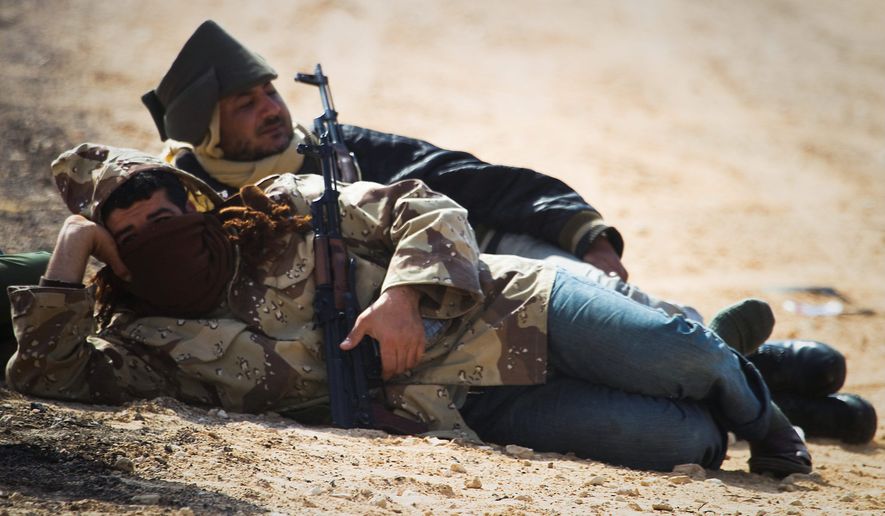Aides close to Moammar Gadhafi are urging the Libyan dictator to crush the resistance in a rebel-held town close to the capital, Tripoli, and then propose a division of the country with the rebels holding the eastern part, rebel sources told The Washington Times on Thursday.
Meanwhile, NATO announced an agreement, after six torturous days of debate, to take over the command of the U.S.-led air war over Libya, which saved the ragtag resistance that was nearly defeated last week.
In another move aimed at opening talks with the rebels, Col. Gadhafi dispatched a “peace convoy” to seek a meeting with the resistance after Friday prayers in the rebel stronghold of Benghazi, according to a Libyan businessman close to the provisional government.
U.N. Secretary-General Ban Ki-moon, meanwhile, is seeking to push a cease-fire and political solution in a separate meeting between Gadhafi envoys and rebel representatives under the auspices of the African Union in Ethiopia on Friday.
The talk from Gadhafi aides on partitioning the North African nation contradicts what the Libyan strongman has said since the Western coalition opened an air campaign to enforce a U.N.-authorized no-fly zone over the weekend.
The rebels, who say they are fighting for a united Libya, are also wary of any talks with Gadhafi envoys. Close supporters of Col. Gadhafi proposed the partition plan to rebel representatives in London on Thursday.
“We are very afraid of this scenario,” Mohamed, a rebel spokesman in Misurata whose last name has been withheld out of concern for his safety, told The Washington Times in a phone interview. Such a division of the country would leave rebels in Misurata under Col. Gadhafi’s control.
“We will not stand for anything other than a united Libya with Tripoli as its capital,” Mohamed said.
Misurata is key to Col. Gadhafi’s strategy to control the western part of Libya.
“The fight for Misurata is the fight for Libya. If he succeeds there, he will be able to consolidate his power in the western region and maybe divide the country as he is planning to,” Fadel M. Lamen, president of the American-Libyan Council, said in Washington at a briefing to thank the international community for its support to the rebels.
Hany Hassan N. Soufrakis, a Libyan businessman based in Cairo who is close to the rebel council, said the Gadhafi regime had sent a “peace convoy” to Benghazi with the aim of meeting rebel representatives after Friday prayers.
“This is a most dangerous development and should be received with extreme care,” Mr. Soufrakis said in a phone interview. He said the rebels were not interested in meeting Col. Gadhafi’s envoys.
“Gadhafi has shown time and again that he has no good intentions. He is just not credible, at least in terms of peace initiatives,” he added.
At NATO headquarters in Brussels, Secretary-General Anders Fogh Rasmussen said “NATO has agreed” to take command of enforcing the no-fly zone over Libya, but the U.S.-led coalition of 13 nations would continue to carry out other operations against Libyan ground forces.
“At this moment, there will still be a coalition operation and a NATO operation,” he said.
The NATO operation will be commanded by U.S. Adm. James Stavrides, the supreme allied commander in Europe.
In Washington, Navy Vice Adm. William Gortney said U.S. warplanes were flying “roughly half” of all of the 130 missions flown since Wednesday. Allies flew about 75 percent of all the defensive air-combat patrols to keep Libyan planes out of the skies. U.S. planes concentrated on identifying and destroying the remaining Libyan mobile air defenses and other intelligence and logistics-related tasks, he said.
On Thursday, the coalition added a second Arab member — the first being Qatar — when Secretary of State Hillary Rodham Clinton announced that 12 United Arab Emirates planes would join the effort.
In Libya, coalition aircraft struck pro-Gadhafi forces around Misurata, and fighting was also reported from Ajdabiya in the east. Pummeled by coalition airstrikes, pro-Gadhafi forces have moved what is left of their tanks and heavy artillery to a youth hostel and vegetable market near the entrance to the city. Their base, an abandoned hospital, was hit by an airstrike Wednesday.
One rebel who traveled from Col. Gadhafi’s hometown of Sirte to Misurata after the strikes said the road was littered with bombed out carcasses of military convoys.
Their strikes have done little to check pro-Gadhafi snipers who waged a battle from the rooftops of buildings.
“The snipers have been wreaking havoc,” said Mohamed, the rebel spokesman.
Six people were killed and two injured in fighting on Thursday. Rebels said all were victims of the snipers. There have been 115 deaths in the city since Friday, according to a rebel tally that could not be independently verified.
“Our youth fighters are confronting the murderous snipers. They are making some headway, but it is a very slow, painful and costly fight,” Mohamed said.
In Washington, Ali S. Aujali, Libya’s former ambassador to the U.S., said the international community must provide better weapons and training to the rebels, if they want the crisis to end soon.
“The protesters are not fighters. They are not professionals. They are students, lawyers,” he said. “If the international community will not be able to help Libyans with armaments, then I think what has been achieved by the coalition hitting the regime … we will not [be able to] take advantage of it.”
• Shaun Waterman contributed to this article, which is based in part on wire service reports.
• Ashish Kumar Sen can be reached at asen@washingtontimes.com.




Please read our comment policy before commenting.